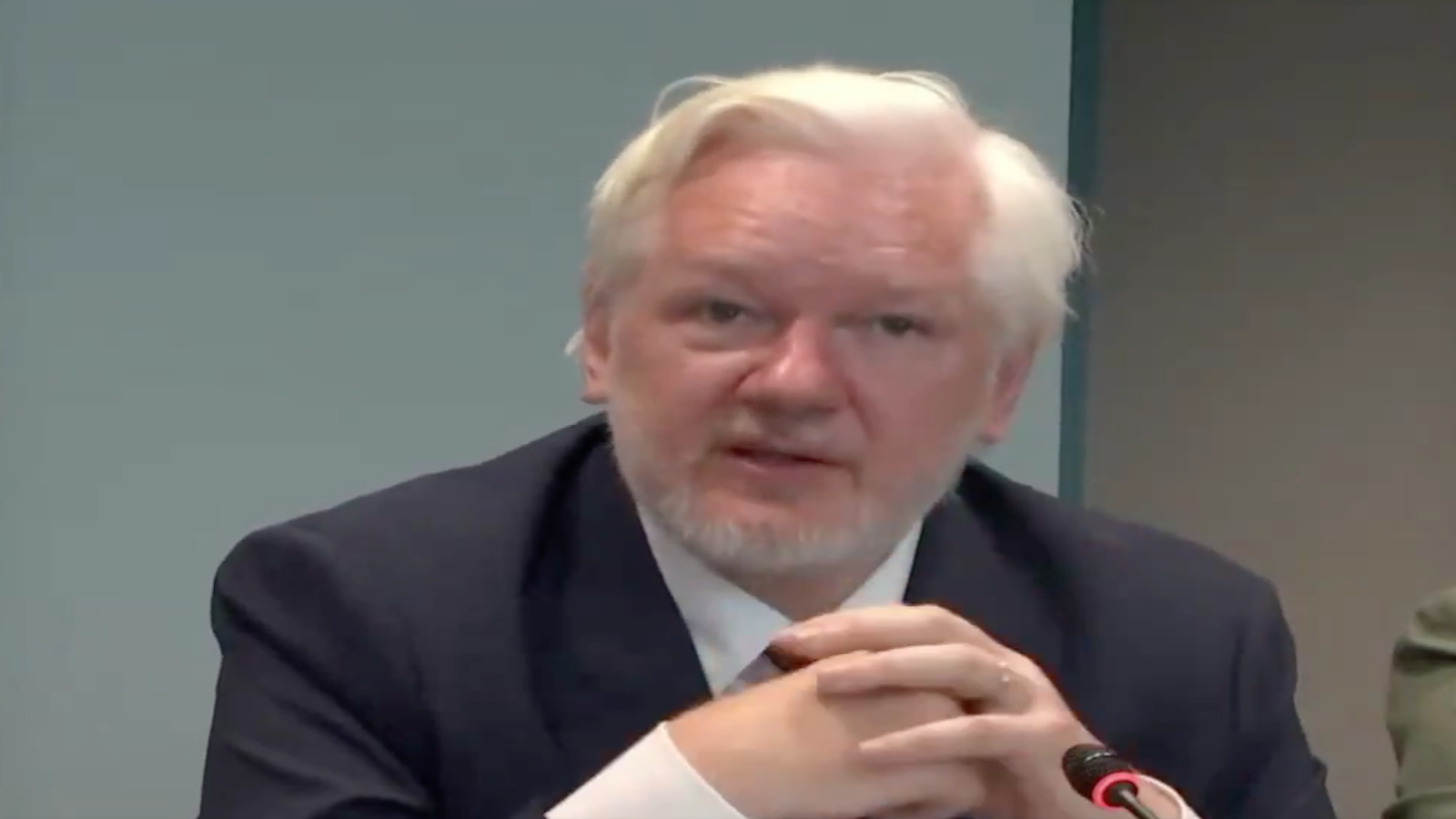Julian Assange is fresh out of prison and made his first public appearance on Tuesday.
It was to the Parliamentary Assembly of the Council of Europe in Strasbourg, France, that Assange told his story.
He arrived with his loyal wife Stella and WikiLeaks editor Kristinn Hrafnsson.
The crowd’s chant? “Assange is free! The world is with you!”
Indeed those of the free world are.
His crime is spilling the secrets of the Establishment via his website, WikiLeaks.
There’s so much we now know that is, in one way or another, linked back to the leaks he gave us.
Julian Assange: "My naivete was believing in the law. When push comes to shove, laws are just pieces of paper. And they can be reinterpreted for political expediency." pic.twitter.com/3rQFLrf1Qr
— Due Dissidence (@DueDissidence) October 1, 2024
Fox News reports:
WikiLeaks founder Julian Assange said Tuesday that he was freed after years of incarceration because he “pled guilty to journalism.”
In his first public remarks since he was released from prison in June, Assange gave evidence of the impact of his detention and conviction to the legal affairs and human rights committee of the Parliamentary Assembly of the Council of Europe in Strasbourg, France. The Parliamentary Assembly includes lawmakers from 46 European countries.
A group of supporters, holding a banner that said “Thank you, Julian” greeted Assange as he stepped out of a van smiling and raising his fist in defiance along with his wife, Stella, and WikiLeaks editor-in-chief, Kristinn Hrafnsson.
“Assange is free! We are here. The world is with you,” one supporter shouted before Assange entered the Council of Europe building early Tuesday.
“I am not free today because the system worked,” Assange said. “I am free today after years of incarceration because I pled guilty to journalism.”
He added: “I pled guilty to seeking information from a source. I pled guilty to obtaining information from a source. And I pled guilty to informing the public what that information was.”
Assange was released in June after five years in a British prison after he pleaded guilty to obtaining and publishing U.S. military secrets in a deal with Justice Department prosecutors that concluded a drawn-out legal saga. Prior to his time in prison, he had spent seven years in self-imposed exile in the Ecuadorian Embassy in London, where he claimed asylum on the grounds of political persecution.
The transition from years in a maximum security prison to addressing the European parliamentarians has been a “profound and a surreal shift,” Assange said as he detailed the experience of isolation in a small cell.
“It strips away one’s sense of self, leaving only the raw essence of existence,” he said, his voice cracking while he offered an apology for his “faltering words” and an “unpolished presentation.”
ADVERTISEMENT
The Guardian adds:
Assange said his wife, Stella Assange, and then baby son had been victims of US spying and attempted evidence-gathering, including what he said was an attempt to take DNA from his six-month-old child’s nappy.
Over nearly 90 minutes, Assange addressed the committee seated next to his wife. He answered questions slowly but firmly, but declined a final question, citing tiredness.
He said it had been a “profound and surreal shift” to go from a Belmarsh cell to Strasbourg. Speaking of his time at Belmarsh, he said: “The experience of isolation for years in a small cell is difficult to convey. It strips away one’s sense of self, leaving only the raw essence of existence. I am yet not fully equipped to speak about what I have endured.”
On Wednesday, assembly members will debate a draft resolution that condemns the “disproportionately severe charges” brought against Assange by the US government.
Drafted by Thórhildur Sunna Ӕvarsdóttir, an Icelandic MP with the left-leaning Pirate party, the resolution states that “misuse” of the US 1917 Espionage Act has had a “dangerous chilling effect, dissuading publishers, journalists and whistleblowers from reporting on governmental misconduct”. The text also criticises the UK, a founding member of the Council of Europe, for failing to protect Assange’s freedom of expression and right to liberty.
In a dissenting opinion, the British conservative peer Richard Keen said the text was “overly polemic and imprecise on key legal points”. He argued it was “regrettable” to describe Assange as a political prisoner in Belmarsh because, he wrote, the WikiLeaks founder had been detained lawfully having violated earlier bail conditions and was considered a flight risk.
“These proceedings did indeed take unusually long, but Mr Assange and his legal team contributed to prolonging them himself. His detention was therefore in no way politically motivated,” Keen wrote, arguing that the designation “belittled the fate of true political prisoners”.
ADVERTISEMENT
He went on record and dropped some heavy bombshell red pills:
Julian Assange outs Mike Pompeo and the CIA. This is huge. pic.twitter.com/JWjZ0wb5zc
— Freyja™ (@FreyjaTarte) October 1, 2024
Breaking: The Council of Europe's Parliamentary Assembly has voted to confirm that Julian Assange was held as a political prisoner. pic.twitter.com/UkHdmD1aI5
— WikiLeaks (@wikileaks) October 2, 2024



Join the conversation!
Please share your thoughts about this article below. We value your opinions, and would love to see you add to the discussion!